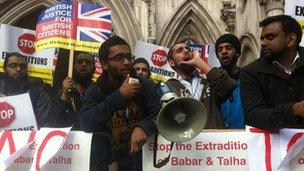Abu Hamza extradition challenge ruling due
- Published

A High Court ruling is due on the last-ditch move by five terror suspects to avoid extradition to the US.
Judges will decide later whether Abu Hamza al-Masri, Babar Ahmad, Syed Talha Ahsan, Adel Abdul Bary and Khaled al-Fawwaz have shown "new and compelling" reasons not to send them.
It comes after the European Court of Human Rights (ECHR) backed successive UK courts in ruling for extradition.
The Home Office says it wants to deport the men "as quickly as possible".
The BBC's Danny Shaw says there were chaotic and noisy scenes outside the Royal Courts of Justice as pro-Abu Hamza and Babar Ahmad campaigners competed for space with a "Hamza out" demonstration.
Trouble flared with a scuffle as an Abu Hamza supporter was chased across the road by police after he tried to take an anti-Abu Hamza banner.
Abuse of process
During his hearing on Wednesday, a judge questioned whether new medical evidence on Abu Hamza was reason enough to delay his extradition.
The radical cleric's lawyers said eight years in prison had resulted in chronic sleep deprivation and depression, meaning he was unfit to plead at a trial and follow the proceedings.
But the judge said Abu Hamza could be treated in the US, and "the sooner he stands trial the better".
James Eadie QC, for the home secretary, said that the Abu Hamza's application to stay extradition on medical grounds amounted to an abuse of process at the last moment.
He said it was "inherently unlikely" that Abu Hamza's mental health had suddenly worsened after the ECHR ruling.
Mr Eadie said if the judges ruled in the home secretary's favour then that "effectively is the end" as no further forms of appeal are available in criminal cases.
Abu Hamza, a former preacher at Finsbury Park Mosque in London, is accused of planning a terror training camp in Oregon and assisting hostage-taking in Yemen.
He was arrested at the request of the US in May 2004 - but the extradition was halted when the UK decided to try him on allegations relating to his sermons. He was convicted in 2006.
Mr al-Fawwaz and Mr Bary are accused of being aides to Osama Bin Laden in London.
Mr Ahmad, a computer expert from South London, has been held in a UK prison without trial for eight years after being accused of raising funds for terrorism with his co-accused, Mr Ahsan, through a website.
- Published5 October 2012
- Published4 October 2012
- Published5 October 2012
- Published24 September 2012
- Published10 April 2012